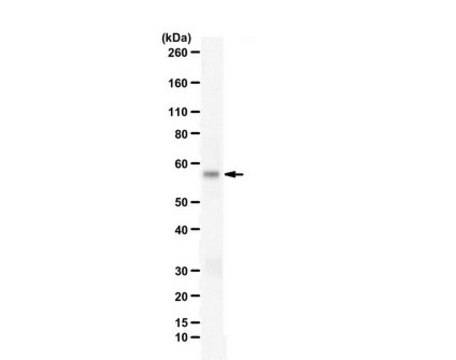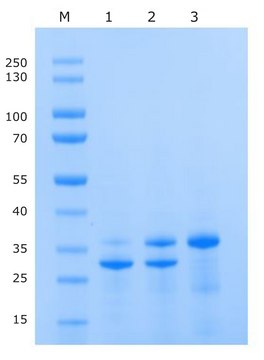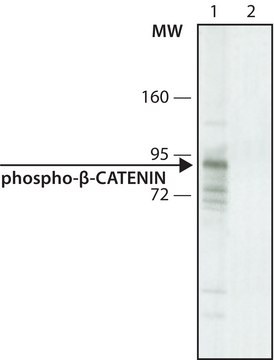F8146
Anti-Factor VII antibody, Mouse monoclonal
clone HVII-1, purified from hybridoma cell culture
Sign Into View Organizational & Contract Pricing
All Photos(1)
About This Item
Recommended Products
biological source
mouse
Quality Level
conjugate
unconjugated
antibody form
purified immunoglobulin
antibody product type
primary antibodies
clone
HVII-1, monoclonal
form
buffered aqueous solution
species reactivity
human
technique(s)
indirect ELISA: suitable
western blot: 1:4,000
isotype
IgG1
UniProt accession no.
shipped in
dry ice
storage temp.
−20°C
target post-translational modification
unmodified
Gene Information
human ... F7(2155)
General description
Anti-Factor VII antibody, mouse monoclonal (mouse) IgG1 isotype) is derived from the HVII-1 hybridoma produced by the fusion of mouse Sp2/0-Ag14 myeloma cells and splenocytes from immunized BAB/c mice. Human coagulation factor VII contains 10 gamma-carboxyglutamic acid residues (Gla), located at the N-terminal region of the molecule. The activated factor VII (factor VIIa) also consists of a light chain with the Gla-domain and an epidermal growth factor domain, which is linked by a disulfide bond to a heavy chain, containing the serine protease catalytic domain.
Specificity
The antibody recognizes an epitope on the light chain of Factor VII in the presence or absence of divalent cations. Clone no. HVII-1 (also cited as clone no. MC1476/E.A.8.1) may be used for purification of Factor VII and for the preparation of Factor VII depleted human plasma.
Immunogen
Factor VII from pooled normal human plasma.
Application
Anti-Factor VII antibody, Mouse monoclonal has been used in:
- the preparation of factor VII - depleted plasma and for purification
- sandwich-type immunoassays
- the evaluation of patients with hereditary factor VII deficiency by an enzyme linked immunosorbent assay (ELISA) or radio immunosorbent assay (RIA)
- the assay of factor VII level in patients with liver disease (a sensitive parameter of liver dysfunction)
- epidemiological studies of the importance of factor VII level as a risk factor for coronary heart disease, cerebrovascular disease and peripheral vascular diseases
- the determination of the activity state of factor VII in in vivo samples when used with a clotting assay
- flow cytometry
Applications in which this antibody has been used successfully, and the associated peer-reviewed papers, are given below.
Flow cytometry/Cell sorting (1 paper)
Flow cytometry/Cell sorting (1 paper)
Monoclonal Anti-Factor VII antibody is suitable for flow cytometry analysis to study the behavior of TF-fVIIa secreted by ovarian cancer cells was associated with microparticles (MPs). It is also suitable for western blot at a dilution of 1:4,000 and indirect ELISA.
Biochem/physiol Actions
Factor VII is a single-chain vitamin K-dependent glycoprotein in human coagulation. It has a molecular weight of ∼50,000Da, present in plasma in trace quantities. It is predominantly synthesized in liver and depends on the posttranslational γ−carboxylation of specific glutamic residues located near the NH2-terminus of the molecule. It is a serine protease zymogen and for activation it requires proteolytic cleavage in the disulfide-linked, two-chain form, Factor VIIa, by Factor Xa, Factor IXa, thrombin and Factor XIIa or β XIIa.
Physical form
Solution in 10 mM HEPES buffer, pH 7.4, with 140 mM sodium chloride and 0.05% sodium azide.
Disclaimer
Unless otherwise stated in our catalog or other company documentation accompanying the product(s), our products are intended for research use only and are not to be used for any other purpose, which includes but is not limited to, unauthorized commercial uses, in vitro diagnostic uses, ex vivo or in vivo therapeutic uses or any type of consumption or application to humans or animals.
Not finding the right product?
Try our Product Selector Tool.
Storage Class Code
10 - Combustible liquids
WGK
nwg
Flash Point(F)
Not applicable
Flash Point(C)
Not applicable
Choose from one of the most recent versions:
Already Own This Product?
Find documentation for the products that you have recently purchased in the Document Library.
Our team of scientists has experience in all areas of research including Life Science, Material Science, Chemical Synthesis, Chromatography, Analytical and many others.
Contact Technical Service








